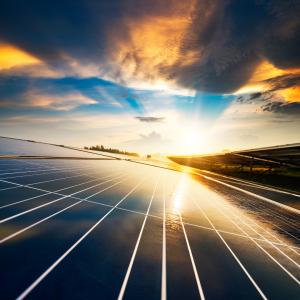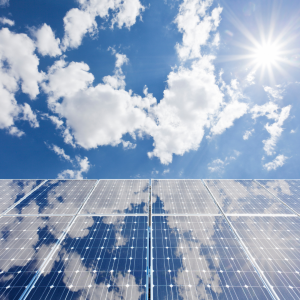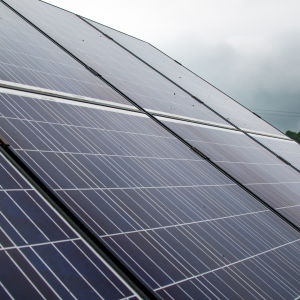With the increasing trend towards renewable energy sources along with rising electricity costs, many homeowners are now seriously considering installing solar panels on their properties. However, given the UK’s notorious cloudiness, it’s natural to question whether solar panels can still generate electricity effectively on cloudy days.
Myths About Solar Panels and Cloudy Weather
First, let’s debunk a few myths about solar panels and cloudy weather:

- Myth 1: Solar Panels Don’t Work at All on Cloudy Days
This is false. Solar panels do work on cloudy days, just at a reduced efficiency.
- Myth 2: Solar Panels Only Work in Hot Climates
Solar panels work based on sunlight, not heat. In fact, they can be more efficient in cooler temperatures.
- Myth 3: Solar Energy Isn’t Reliable
Solar energy systems often include battery storage. This means you can store excess energy generated on sunny days for use when it’s cloudy or at night.
Solar Panels and Cloudy Weather
Solar panels work by converting sunlight into electricity using photovoltaic cells. Even on cloudy days, solar panels still receive sunlight. Clouds do block some sunlight, but not all of it. Diffused sunlight, which is scattered by clouds, still reaches your panels. While the efficiency does lessen, panels can still produce a significant amount of energy.
How Much Power Do Solar Panels Produce on Cloudy Days?
On a cloudy day, solar panels can produce around 10-25% of their typical output. This varies based on cloud thickness and coverage. Light rain or thin clouds have less impact compared to dense, dark clouds.
Several factors influence how well your solar panels perform when it’s cloudy:
 Panel Quality
Panel Quality
Higher quality panels are more efficient in low-light conditions. Investing in premium panels will ensure better performance on cloudy days.
Installation Angle
The angle of your solar panels also matters. Panels installed at an optimal angle capture more light, even when it’s diffused by clouds.
Geographic Location
Your location also plays a role. Areas with more annual sunlight will see less impact from cloudy days. However, even in regions with frequent overcast weather, solar panels are a viable option.
Solar Panels and Cooler Climates: A UK Perspective
You might think the UK’s cooler climate isn’t ideal for solar panels, but cooler temperatures can actually benefit solar panel performance.
Efficiency and Temperature
Solar panels are more efficient at cooler temperatures. When panels get too hot, their efficiency drops. In cooler climates, like the UK, panels often operate closer to their optimal temperature, leading to better performance.
Consistent Performance
The UK has a moderate climate with fewer extreme temperature fluctuations. This consistency helps maintain steady solar panel performance throughout the year.
Longer Lifespan
Cooler temperatures can also extend the lifespan of solar panels. Heat can accelerate the degradation of photovoltaic cells, so panels in cooler climates may last longer and require less maintenance.
How to Maximise Solar Panel Efficiency
Even if you live in a cloudy area, there are ways to maximise the efficiency of your solar panels.
Regular Maintenance
Keep your panels clean and free of debris. Dirt and grime can reduce their efficiency.
Use a Solar Battery
A solar battery stores excess energy. You can use this stored energy when your panels aren’t producing as much, like on cloudy days or at night.
Monitor Your System
Use a solar monitoring system to track your panels’ performance. This helps you spot any issues and ensure your system is working efficiently.
Optimise Your Energy Use
Adjust your energy use based on solar production. Use high-energy appliances during peak sunlight hours to make the most of your solar power.
Buy The Right Type of Panels
Bifacial panels capture sunlight from both sides. This can increase energy production, especially on cloudy days when light is diffused. On the other hand, thin-film panels are more efficient in low-light conditions. They’re flexible and can be installed in various locations, increasing their effectiveness.
So as we have seen, solar panels do work on cloudy days. They may not be as efficient as on sunny days, but they still produce energy. With the right equipment and setup, solar panels can be a reliable source of power, no matter the weather.
Consider your location, the quality of the panels, and proper maintenance to get the most out of your solar energy system. By investing in solar power, you’re not only saving on energy costs but also contributing to a greener planet!
If you have any questions or need further information, feel free to reach out to us!
